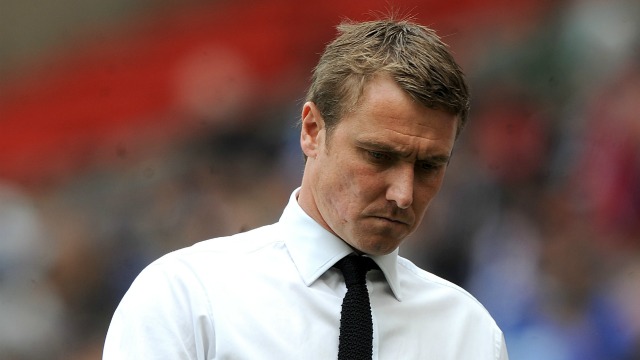When James Vaughan signed on a season-long loan deal for Huddersfield Town back in August, few people realised just how important he would become to Town’s season. Question marks over his long-term fitness and his modest goalscoring record (17 goals in 93 league appearances before joining Town) meant some fans were skeptical as to how much of a contribution he could make this season. However, a relative absence of injuries and a goalscoring average of better than 1 in 3 at the time of writing have left few Town fans in any doubt that Vaughan is a player of real quality and that every effort must be made to try and secure his permanent signing.
Vaughan is Town’s leading scorer this season with 9 goals but Vaughan should not be judged on his goalscoring record alone. Despite the fact he is only on loan, he has displayed genuine passion, determination and character – attributes which have endeared him to the Town faithful during his brief spell at the club so far. Heavy defeats, such as the thrashings Town received against Leicester and Nottingham Forest, clearly hit Vaughan hard and it is refreshing to see a loan player show such genuine commitment to the cause. Vaughan’s phenomenal work rate and determination are valuable assets to the team in terms of both chance creation and defending from the front. If anything it could be said that Vaughan works too hard. At times he arguably pushes himself too far and this has occasionally resulted in injuries and needless bookings – 11 bookings in 29 games is staggering for a centre-forward. Nevertheless, as Vaughan’s game is based around robust hard work, shirking challenges or holding back in any way to avoid bookings or injuries would take away a large part of what makes Vaughan such an effective player.
To demonstrate just how important Vaughan has been to Town this season, it is worth looking at Town’s win ratio with and without Vaughan in the league this season. This season, Vaughan has started 23 games. In these games Town have accumulated 34 points – 9 wins, 7 draws and 7 defeats. This means Town have gained 1.48 points for each game Vaughan has started. To put this into context, if this points to game ratio was maintained over a season then it would give Town 68 points. In contrast, in the 15 games Vaughan has not started, Town have picked up just 13 points – 3 wins, 4 draws and 8 defeats. This is a points to game ratio of just 0.87 points per game and this would give Town only 40 points over the course of a season. Obviously it is not as simple as this – even if Vaughan had started every game this year it is highly unlikely Town would have acquired 68 points – but it does go some way towards proving just how vital Vaughan has been to Town’s season.
As Vaughan has clearly proved himself in terms of ability, and as his injury record has been generally good, Huddersfield should be doing everything in their power to try and secure a permanent deal for Vaughan. But can a deal realistically be done? The first thing that has to be considered is whether Norwich would be willing to sell. With Norwich’s Premier League survival all but guaranteed, it seems that Vaughan will find himself surplus to requirements at Carrow Road next season. As well as already having Grant Holt and Simeon Jackson on the books, Norwich have brought in Luciano Becchio and Kei Kamara since Vaughan joined Town in August. With the impending arrival of Dutch international Ricky van Wolfswinkel, Vaughan appears to be well down the pecking order in a team that often plays with just one out and out striker. In this regard it seems that Norwich will probably be willing to listen to offers if a reasonable bid comes in.
The second thing, therefore, that must be contemplated is whether Huddersfield can afford to sign Vaughan. Vaughan would likely command a fee in the region of 1 to 1.5 million pounds, which is a significant fee for a lower end Championship side. However, the sale of Jordan Rhodes last summer means that Town should be able to spend some money (within reason) in the transfer market this summer. Though Chairman Dean Hoyle has spoken of the need to make Town self-sufficient and to further reduce the club’s wage bill, the fact is Town simply cannot afford to pass up on the chance to sign Vaughan. When the loan deals of Vaughan, Theo Robinson and Jermaine Beckford expire in the summer, Town could have only one striker – the untested Jimmy Spencer – on their books. Alan Lee’s contract almost certainly won’t be renewed whilst Lee Novak’s future at the club is seemingly undecided. Given the need to bolster Town’s attacking options, therefore, and the potential availability of Vaughan, Town would be mad to pass up the opportunity to sign Vaughan permanently if he was available at a reasonable price.
The only problem that leaves is whether Vaughan himself would be interested in signing permanently. Vaughan is not the type of player who will just be happy to sit on the bench or fester in the reserves at Norwich, and in the aftermath of the Leeds game Vaughan admitted he would be happy to discuss terms if a fee could be agreed. Vaughan would likely become one of the clubs highest earners if he were to join but given the fact that a number of the existing high-earners, such as Alan Lee, are out of contract in the summer, Town should be able to offer Vaughan a decent contract and still have money left over to bring in some more reinforcements. However, although Vaughan is clearly enjoying his loan spell at the club immensely, it remains to be seen whether Vaughan would be prepared to take what would probably be a sizable wage cut in exchange for regular first team football. Also, as Vaughan has proved himself a highly capable Championship striker whilst playing for a struggling team, there is a chance that Town could be gazumped to his signing if a bigger club comes in with an offer over the summer. For periods this season Vaughan has simply looked too good for a Huddersfield team that has, at times, struggled to adapt to the demands of the Championship and at points he has almost single handedly carried the responsibility of scoring Town’s goals this season. With this in mind it would be hard to begrudge Vaughan if he decided to take up the opportunity to play for a team with greater aspirations and more financial clout if the offer was forthcoming.
Nevertheless if Huddersfield do maintain Championship status, they must do everything in their power to attempt to bring Vaughan in permanently. Though Vaughan would not be cheap, he has proved himself a player of real quality and few players have made as much of an impact during a loan spell for Town as Vaughan has. The emphasis must be on quality rather than quantity this summer and Town would be much better off signing a player of Vaughan’s caliber than signing 2 or 3 ‘squad players.’ Some of the money from the Jordan Rhodes sale must be used over the summer if Town are to be at all competitive next season and if a deal could be done for £1-1.5 million then that would surely be money well spent by Town. If Town are to have any realistic chance of making Vaughan’s loan move permanent, then staying in the Championship is vital. Town’s Championship status next season is far from certain and any chances of signing Vaughan hinge on survival. Vaughan would not want to sign for a team in League One, nor would a League One side be able to afford his transfer fee or wages. A deal for Vaughan, therefore, is by no means guaranteed and it would be foolish to think that Vaughan will certainly sign for Town – even if Championship status is secured – but the powers that be must do everything they can to try and sign him. If a team comes in with a better offer or if Norwich are unwilling to do business then that is fair enough. However, it would be criminal if Town made no attempt to permanently sign a player with such high workrate, determination, passion and, most of all, quality.
For more HTFC based ramblings follow me on twitter: (JThorn26)





